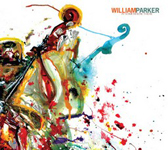|
|
 |
Dusted Reviews
Artist: William Parker Album: At Somewhere There Label: Barnyard Review date: Jun. 16, 2010 |

|
|
|
 |
Solo bass improvisation has been a fulcrum of William Parker’s performance language for decades. The frugal format tends to bring out his best, but it also requires patience and persistence on the part of an audience. Parker isn’t one to easily edit or censor expression and his expeditions independent of accompaniment commonly involve challenging degrees of density, length and repetition.
A recital at D.C.’s seminal Kaffa House in the summer of 1997 served as my initiation to both the intense pleasures and potential perils of hearing him in such a context. The crowd was similar in size to the one that assembled for the music released as At Somewhere There, a title eponymous with the Toronto club that served as venue in the summer of 2008. Over one mesmerizing stretch in the Kaffa gig, he had four bows cantilevering against separate strings, each invoking an overlapping web of harmonics. An assembly of slack jaws ensued, my own among them. That sort of magic happens here, too, though without visuals, I can’t confirm the number of bows in play at any one time.
Blossoming to an expansive 48-minutes, “Cathedral Wisdom Light” occupies the bulk of the concert. Parker saws purposefully away for the first 12, swathes of vibrant tonal color and timbral texture shaving off in coruscating ribbons that pileup around him. Pizzicato elements only occur sparingly, primarily as accents for the constant scribbling of hummingbird bow. Parker sometimes plays fast and loose with intonation, his ardent strokes skirting the edges of abrasive atonality. Fleeting moments of arch lyricism contrast with friction-pitched forays within narrow segments of rosin-dusted string. The spiraling patterns scroll by with such rapidity that cataloging them quickly becomes an exercise in abject futility. That sort of taxonomical response is a natural one, but it’s also beside the larger point. Parker gives himself up to the extemporaneous outpouring and logically expects the audience to do the same.
The other, unheard element to the performance is Music Witness Jeff Schlanger, a fixture at free jazz concerts for practically longer than Parker’s been performing, and a person preternaturally suited to complementing the sounds through visual means. His performance-spanning painting, splattered with bleeding colors and bold abstractions of Parker’s bass playing, works as both packaging art and vivid ocular analogue to the audio.
Two dedicatory encore-sized tracks complete the program. “For Don Cherry” finds Parker vocalizing over dousn’gouni, cousin to the kora, while “For Ella Parker” is for fleetly blown double flute. Neither carries even close to the wallop of their mammoth predecessor. Instead, they work as effective leavening agents to the introspective intensity of what’s come prior.
By Derek Taylor
|







